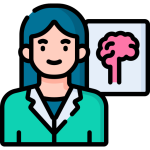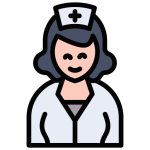Speech-Language Pathologists
In the last few years, Alzheimer’s disease, Lou Gehrig’s disease (ALS), and stuttering all made big screen debuts in three Oscar-winning films: Still Alice, The Theory of Everything, and The King’s Speech. These films worked to raise the awareness of frequent speech, language, and cognitive disorders thousands of individuals are diagnosed with each year.
It also opened the door for greater discussion around the health care professionals who assist with the care of each disorder. These professionals, speech-language pathologists (SLPs), evaluate and treat children and adults who have difficulty with speech or language.
You may not have realized the disorders when you watched each of the films, but SLPs work with individuals who face speech, language, and cognitive disorders every day.
What Issues Do SLPs Treat?
First and foremost, an SLP’s goal is to establish basic and achievable communication goals. He or she does this by evaluating, diagnosing, and treating the issue. Common disorders that may be evaluated and treated by an SLP include both speech and language disorders and some cognitive issues. Some include: Articulation disorders, cognitive impairments or delays, social language use or pragmatic disorders, expressive and receptive language impairments or delays, fluency and stuttering, voice disorders, auditory processing disorder, oral motor issues, and dysphagia.
Some common issues SLPs treat include:
- Non-verbal and limited verbal skills: People with severe aphasia, apraxia of speech, dysarthria, expressive language, and voice disorders struggle with these skills. These individuals typically benefit from augmentative and alternative communication systems
- Receptive Language Disorder: Difficulty comprehending communication. For example: The inability to follow directions
- Expressive Language Disorder: Trouble using language to express one’s thoughts and feelings. For example: Making a request, asking a question, labeling an object, or giving simple directions
- Pragmatic Language Disorder: Struggling to effectively and appropriately use language in social communication. For example, greeting another person or asking for help
- Cognitive and Memory Difficulties: Difficulty remembering the words to name familiar objects and people, asking for help, and following directions
- Aural Rehab: speech and language therapy designed specifically to treat people who are hard-of-hearing and may be using a hearing aid or cochlear implant to learn to process and produce verbal language through their hearing technology.
The Role of SLPs in Treating Aphasia
Speech-language pathologists (SLPs) play a central role in the screening, assessment, diagnosis, and treatment of people with aphasia. SLPs working with clients with aphasia often help with all of the following:
- Teaching other professionals about the needs of people with aphasia and the role of SLPs in diagnosing and managing aphasia
- Screening individuals who present with language and communication difficulties and determining the need for further assessment and/or referral for other services
- Conducting culturally and linguistically relevant, comprehensive assessments of language and communication
- Diagnosing the presence or absence of aphasia
- Referring clients to other professionals to rule out other conditions and to facilitate access to comprehensive services
- Designing and implementing person-centered treatment plans
- Working collaboratively with the patient and treatment team
- Counseling people with aphasia and their families regarding communication-related issues
- Consulting with other professionals to facilitate program development and to provide supervision, evaluation, and/or expert testimony, as appropriate
- Advocating for individuals with aphasia and their families
Explore the links below to learn more about some of the healthcare providers that may be part of your team.
Speech-Language Pathologists

Occupational and Physical Therapists

Neurologists and Cardiologists

Case Managers and Social Workers

Nurse
Practitioners

Dietitians and
Nutritionists

